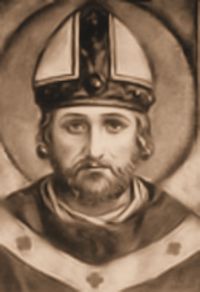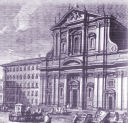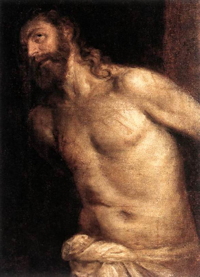Lent: March 16th
Saturday in the Fourth Week of Lent
Other Commemorations: St. Heribert, Archbishop (RM); St. Jean Brebeuf, Priest and Martyr (RM)
» Enjoy our Liturgical Seasons series of e-books!
This Saturday of the Fourth Week of Lent in the early ages of Christianity, was called Sitientes, taken from the first word of the original Introit of the Mass meaning "Thirsting." The Church was addressing her catechumens in the words of Isaiah and invites them to thirst after the grace to come and receive it in the holy Sacrament of Baptism. This marked the last day of the Lenten season before entering into Passiontide. In the current Liturgical calendar the last day of Lent before Holy Week would be Saturday of the Fifth Week of Lent, but the beginning of the Paschal Triduum on Holy Thursday evening marks the official end of the Lenten season.
According to the Roman Martyrology, today commemorates St. Heribert (970-1021), who was Archbishop of Cologne and Chancellor of Holy Roman Emperor Otto III, and was canonized in 1074. St. Jean Brebeuf (1593-1649) is also commemorated today, but in the United States is celebrated on October 19.
Meditation—The Need for Mortification Today
Lent is essentially a time of prayer and mortification. The body which has been indulged for so many months must now be denied. Even though fasting and abstinence are impossible for some of us, the penitential spirit may not be shirked. Modern creeds approximate more and more the pagan conception of man, and the penitential spirit is, of course, unbearable to those whose only philosophy of life is the song of the banqueter: "Let us eat, drink and be merry, for tomorrow we die."
Modern civilization scoffs at the notion of doing penance as if it were a vice of the pietist who wants to exalt one side of his nature at the expense of the other, although it is no small thing that the soul should be king of the body. Penance has a deeper significance than that, as I have pointed out. But, says the modern scoffer, "a man is no better and no worse than God made him. God who gave him impulses cannot be angry if he obeys them. Let a man snatch the passing pleasure."
In the Cathedral of Lubeck in Germany is a Lenten Monitory which may be taken as God's answer to such blasphemy:
Ye call Me Master, and obey Me not:
Ye call Me Light, and see Me not;
Ye call Me Way, and walk Me not;
Ye call Me Life, and desire Me not;
Ye call Me Wise, and follow Me not:
Ye call Me Fair, and love Me not;
Ye call Me Rich, and ask Me not:
Ye call Me Eternal, and seek Me not;
Ye call Me Gracious, and trust Me not;
Ye call Me Noble, and serve Me not;
Ye call Me God, and fear Me not;
If I condemn you—blame Me not. Amen
—Excerpted from Message of the Gospels
Saint Heribert
 Heribert was born in Worms and he was the son of Hugo, count of Worms. He was educated in the school of Worms Cathedral and at the Benedictine Gorze Abbey in Lorraine, France. He returned to Worms Cathedral to be provost and was ordained a priest in 994.
Heribert was born in Worms and he was the son of Hugo, count of Worms. He was educated in the school of Worms Cathedral and at the Benedictine Gorze Abbey in Lorraine, France. He returned to Worms Cathedral to be provost and was ordained a priest in 994.
In the same year, Otto III appointed him chancellor for Italy and four years later also for Germany, a position which he held until Otto's death on 23 January 1002. Heribert was made an archbishop of Cologne on 998. Then, he also served Emperor St. Henry.
Heribert built the monastery of Deutz, on the Rhine and performed miracles, including ending a drought. He is thus invoked for rains.
He died in Cologne on March 16, 1021 and was buried at Deutz.
He was already honored as a saint during his lifetime and was canonized by Pope St. Gregory VII about 1074.
—©Evangelizo.org
Patronage: against drought; for rain; Deutz, Germany
Symbols and Representation: archbishop calling down rain by his prayers; man kneeling before Saint Henry II; episcopal attire
Highlights and Things to Do:
- Read more about St. Heribert:
- Watch this short video from gloria.tv on St. Heribert of Cologne.
- His relics were relocated from Old St. Heribert to the Neu-St.Heribert church in Köln-Deutz.

Saturday of the Fourth Week of Lent
Station with San Nicola in Carcere (St. Nicholas in Prison):
Today's Station is at St. Nicholas of Barin in Prison, dedicated to the popular St. Nicholas of Myra or also referred to as St. Nicholas of Bari, whose feast is December 6. It was constructed in the ruins of two temples and the ancient Forum Olitorium, with visible fragments from the ruins reused in the church. The most important of the temples was the Temple of Piety, built by Acilius Glabrius, consul in 191 B.C. The dedication to St. Nicholas was made by the Greek population in the area.
For more on San Nicola in Carcere, see:
For further information on the Station Churches, see The Stational Church.






